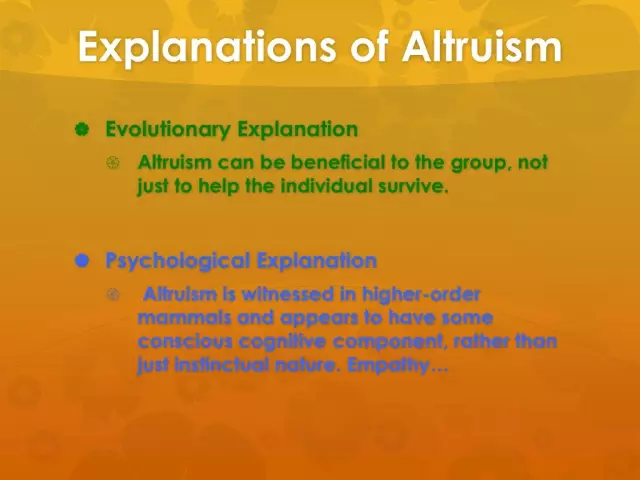- Author Rachel Wainwright [email protected].
- Public 2023-12-15 07:39.
- Last modified 2025-11-02 20:14.
Selfishness

Selfishness is a human value system characterized by the predominance of personal needs in relation to the interests and needs of another person or social group. At the same time, the satisfaction of one's own interests is considered as the highest good. In psychological and ethical theories, selfishness is considered an innate property that must be overcome.
Selfish theories
There are two main approaches to the problem of egoism:
- It is natural for man to strive for pleasure, avoiding suffering;
- A person in his moral activity must follow personal interests.
In ancient philosophy, the idea was expressed that people are selfish from birth, and all morality should proceed from this. In defiance of feudal-Christian morality, preaching the rejection of worldly pleasures, the French materialists argued, following Democritus and Epicurus, that morality engendered exclusively the earthly interests of people.
The essence of the ethical concept of "reasonable egoism" was that people should satisfy their needs "rationally", then they will not contradict the interests of individuals and society as a whole, but, on the contrary, will serve them. By the end of the XIX century. this theory degenerated into the establishment of the fundamental priority of personal needs over any others. In the ordinary consciousness, rational egoism is the ability to live by one's own interests, without neglecting the values of the people around, since this is short-sighted and unprofitable for one reason or another.
The theory of social exchange puts forward arguments in favor of selfishness, according to which people, consciously or unconsciously, want to receive the maximum possible reward at the lowest cost. From this theory it follows that any actions are performed for selfish motives in order to receive optimal reward or avoid punishment. The implicit benefit that seemingly altruistic actions are dictated is in gaining social approval, increasing self-esteem, getting rid of feelings of anxiety or remorse. This approach to the problem of egoism does not take into account that the ultimate goal of the egoist is to improve his own situation, and the altruist is to take care of another person. Phenomena such as unconditional love, sympathy, and empathy are either disregarded or artificially fit into the Procrustean bed of theory.

Since it is customary to oppose egoism to altruism, there are a number of theories according to which egoism and arguments in its favor may lose force for various reasons. For example, the concept of social norms is based on the fact that the provision of assistance is associated with the existence of certain rules in society that force one to abandon selfish behavior in order to fulfill them. The norm of reciprocity prompts a person to respond with good, and not evil, to those who came to his aid. The social responsibility norm prescribes taking care of those who need it, regardless of the time spent and the gratitude received in return.
Selfishness often receives a negative assessment of society, and a conscious choice of such a strategy of behavior is considered immoral. This quality is condemned at all levels: in philosophy, religion, government and in everyday life.
It is believed that selfishness begins to dominate if the tactics of upbringing are aimed at consolidating overestimated self-esteem and egocentrism. As a result, a strong orientation towards personal experiences, interests and needs is formed. Subsequently, selfishness and indifference to other people and their inner world can lead to loneliness, and the world around you will be perceived as hostile.
Found a mistake in the text? Select it and press Ctrl + Enter.






